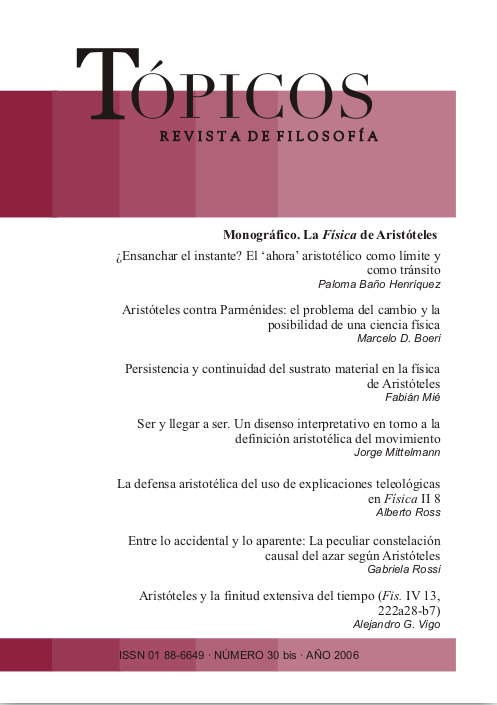Publicado 2013-11-28
Palabras clave
- Aristóteles,
- Física,
- azar,
- causas.
Cómo citar
Resumen
Este artículo trata el concepto aristotélico de azar, tal como se lo presenta en Física II 4-6. La sección central del artículo se concentra en el análisis de la definición aristotélica de azar y sus peculiaridades esenciales: el hecho de ser una causa accidental (eficiente) y el hecho de existir en el dominio de lo que es en vista de un fin. Según Rossi, ambas características corresponderían a un aspecto causal (en un sentido accidental) y a un aspecto no causal (o sólo aparentemente causal) del azar. Por último, la autora también trata de mostrar la conexión estructural entre los aspectos antes mencionados, tomando como hecho clave la tesis de la coincidencia entre las causas formal, final y eficiente.
Referencias
- Annas, J. (1982). Aristotle on inefficient causes. En Philosophical Quarterly, 32: 311-326.
- Aristóteles. (1924). Metaphysics. Vols. 2. W. D. Ross (ed.) Oxford.
- ____ (1936). Physics. W. D. Ross (ed.) Oxford.
- ____ (1992). Physics Books I and II. W. Charlton (trans.) Oxford.
- ____ (1993). Física I y II. M. D. Boeri (trad.) Buenos Aires: Biblos.
- Boeri, M. D. (1995). Chance and Teleology in Aristotle’s Physics. En International Philosophical Quarterly, 35 (1): 87-96.
- Charles, D. (1984). Aristotle’s Philosophy of Action. New York: Ithaca.
- ____ (1991). Teleological causation in the Physics. En Aristotle’s Physics. A Collection of Essays. L. Judson (ed.) (101-128). Oxford.
- Everson, S. (1988). L’explication aristotélicienne du hasard. En Revue de la philosophie ancienne, 6: 39-76.
- Frede, D. (1992). Accidental causes in Aristotle. En Synthèse, 92: 39-62.
- Freeland, C. (1991). Accidental Causes and Real Explanations. En Aristotle’s Physics. A Collection of Essays. L. Judson (ed.) (49-72). Oxford.
- Laplace, P. (1886). Théorie Analytique des Probabilités. En Oeuvres Complètes. Vol. 7. Paris.
- Lennox, J. (1982). Teleology, chance, and Aristotle’s Theory of Spontaneous Generation. En Journal of the History of Philosophy, 20: 219-238.
- ____ (1984). Aristotle on Chance. En Archiv für Geschichte der Philosophie, 66: 52-60.
- ____ (2001). Aristotle’s Philosophy of Biology. Cambridge.
- Loening, R. (1903). Die Zurechnungslehre des Aristoteles. Hildesheim.
- Long, A., Sedley, D. (1987). The Hellenistic Philosophers. Vols. 2. Cambridge: Cambridge University Press.
- Madigan, A. (1984). Metaphysics E 3: a modest proposal. En Phronesis, 29: 123-136.
- Mansion, A. (1913). Introduction à la Physique Aristotélicienne. Louvain-Paris.
- Moravcsik, J. (1991). What Makes Reality Intelligible? Reflections on Aristotle’s Theory of Aitia. En Aristotle’s Physics. A Collection of Essays. L. Judson (ed.) (31-47). Oxford.
- Natali, C. (1999). Problemas de la noción de causa final en Aristóteles. En Anuario Filosófico, 32: 39-57.
- Simplicio. (1882). In Aristotelis Physicorum Libros Quattor Priores Commentaria. H. Diels (ed.) Berlin.
- ____ (1997). On Aristotle’s Physics 2. B. Fleet (trans.) New York: Cornell University Press.
- Wieland, W. (1962). Die aristotelische Physik. Göttingen.
- ____ (1972). Zeitliche Kausalstrukturen in der aristotelischen Logik. En Archiv für Geschichte der Philosophie, 54: 229-237.
- Zeller, E. (1921). Die Philosophie der Griechen in ihrer geschichtlichen Entwicklung.






